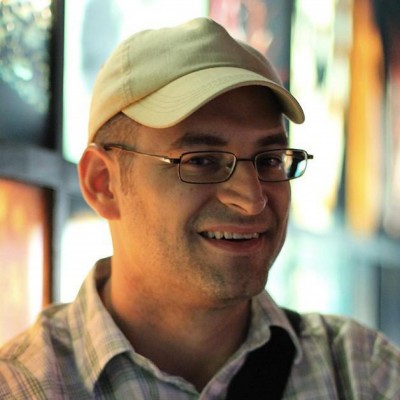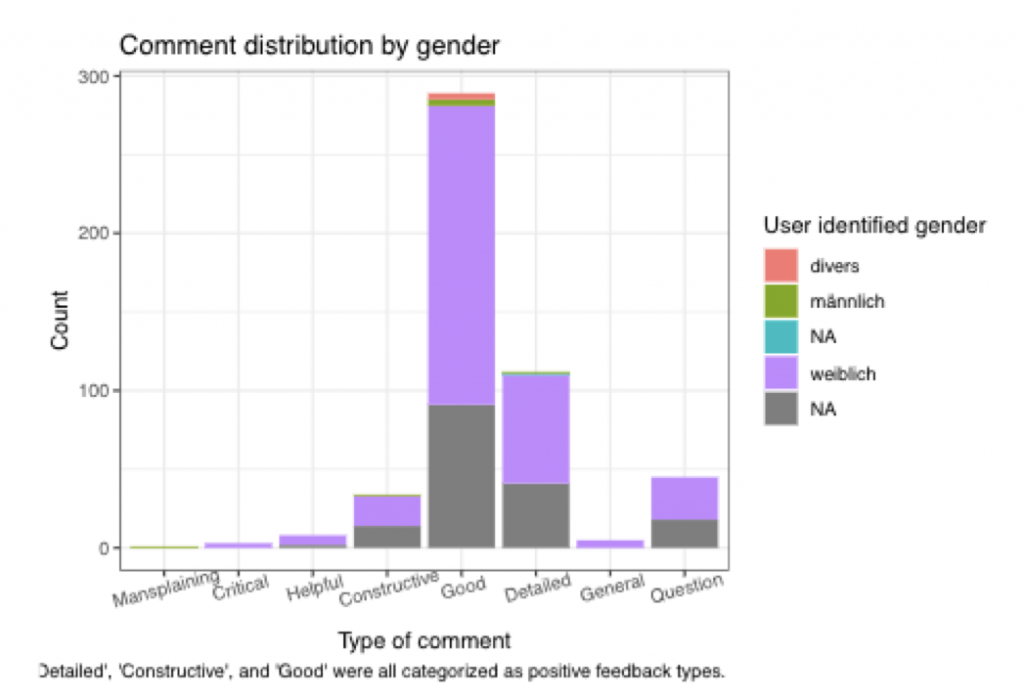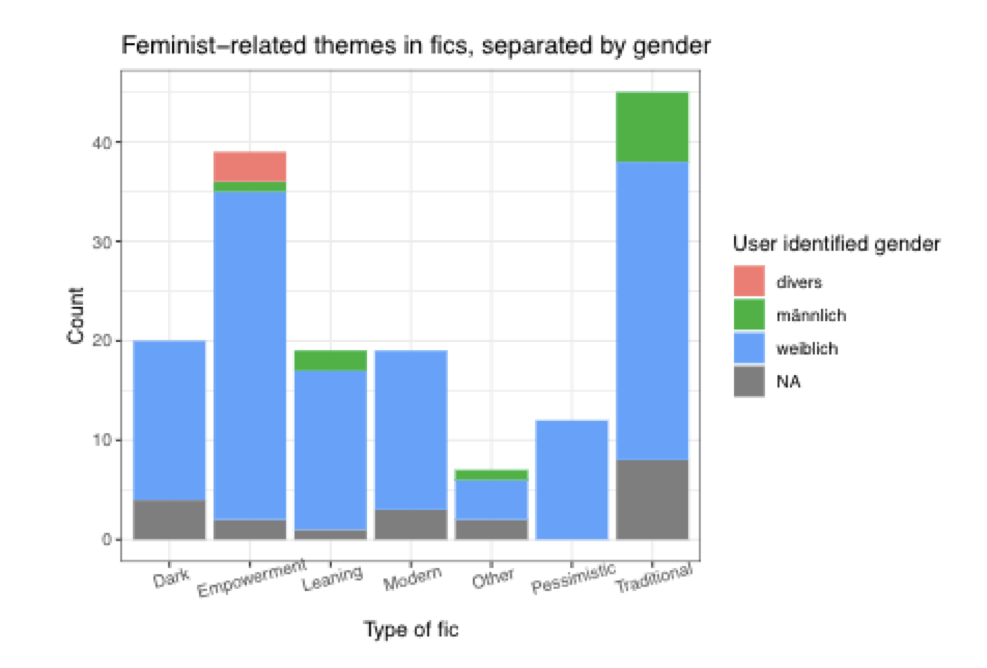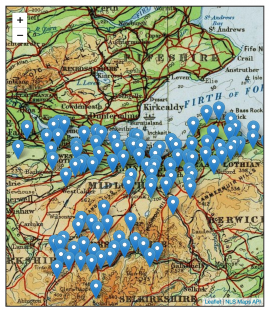[Please enjoy this guest post by Michelle D. Brock, Associate Professor of History at Washington and Lee University. Professor Brock has been a fabulous supporter of DH at W&L through the years and we’re thrilled to see this project take off.]
In the spring of 2020 (before the world seemed to change overnight), I spent just over two wonderful months as a Digital Scholarship Fellow at the Institute for Advanced Studies in the Humanities at the University of Edinburgh during my sabbatical from W&L. During this time, I pursued work on a project called Mapping the Scottish Reformation (MSR), directed by myself and Chris Langley of Newman University and featuring Mackenzie Brooks on our project team and Paul Youngman on our advisory board.
Mapping the Scottish Reformation (MSR) is a digital prosopography of ministers who served in the Church of Scotland between the Reformation Parliament of 1560 to the Revolution in 1689. By extracting data from thousands of pages of ecclesiastical court records held by the National Records of Scotland (NRS), Mapping the Scottish Reformation tracks clerical careers, showing where they were educated, how they moved between parishes, and their personal and disciplinary history. This early modern data drives a powerful mapping engine that will allow users to build their own searches to track clerical careers over time and space.
The need for such a project was born of the fact that, despite a few excellent academic studies of individual ministers written in recent years, we still know remarkably little about this massive and diverse group. Many questions remain unanswered: How many ministers were moving from one area of Scotland to another? What was the influence of key presbyteries—the regional governing bodies of the Scottish kirk—or universities in this process? What was the average period of tenure for a minister? As of now, there is no way to answer such questions comprehensively, efficiently, and accurately. The voluminous ecclesiastical court records that contain the most detail about the careers of the clergy are not indexed, cumbersome to search, and completely inaccessible to the public or scholars less familiar with the challenges of Scottish handwriting. The multi-volume print source with much of this biographical data on ministers, Hew Scott’s invaluable Fasti Ecclesiae Scoticanae, is not searchable across volumes and contains numerous errors and omissions. A new resource is thus necessary to both search and visualize clerical data, and we intend Mapping the Scottish Reformation to be that resource.
Our project began in earnest in 2017, when, thanks to funding from a W&L Mellon grant, Caroline Nowlin ’19 and Damien Hansford (a postgraduate at Newman University) began working with the Project Directors to pull initial data from the Fasti that could be used to test the feasibility of the project. Three years and a National Endowment for the Humanities HCRR grant later, we are in the pilot “proof of concept” phase of MSR, centered on gathering data on the clergy in the Synod of Lothian and Tweeddale—a large and complex region that includes modern day Edinburgh. As such, my time at IASH was spent almost exclusively going through the presbytery records from this synod region to collect data on ministers at all levels in their clerical careers. I have often referred to this as the “unsexy” part of our work—dealing with the nitty gritty of navigating often challenging and inconsistent records in order to gather the data that will power Mapping the Scottish Reformation. There was, of course, no better setting to do this work in than IASH, an institute in the heart of the very university where many of the ministers in the Synod of Lothian and Tweeddale were educated and near to the parishes where many of the most prominent of them served.
Throughout my fellowship period, two questions were at the forefront of my mind: Are there patterns, chronological or regional, that account for the great variance in ministerial lives and trajectories? Was any such thing as a “typical” clerical career at all? What Dr. Langley and I have learned over the previous months is that the answers to these questions are significantly more complicated than previously understood by both historians and the wider public.
As we discussed during a presentation given in January at the Centre for Data, Culture and Society, the clerical career path was far less standardized than scholars usually assume. The terminology generally applied by historians and drawn from Hew Scott’s work— of “admitting,” “instituting,” and “transferring” ministers — was one of a distinct profession. Unfortunately, by applying such terms to the early modern ministry, we may be transposing a system and language of formality that just wasn’t there or wasn’t yet fully developed. Thus, one of our central goals is to shed light on the complexity of clerical experiences and development of the ministerial profession by capturing messy data from manuscripts and turning it into something machine readable and suited to a database and visualization layer. In short, we hope to make the qualitative quantitative, and to do so in a way that can also serve as a supplementary finding aid to the rich church court records held at NRS.
To date, my co-Director and I have gone through approximately 3,000 pages of presbytery minutes and collected information on over 300 clerics across more than twenty categories using Google Sheets. Dr. Langley has begun the process of uploading this data to Wikidata and running initial queries using SPARQL to generate basic data-driven maps. The benefit of using Wikidata at this phase in our project is that it is a linked open data platform and is already used as a data repository for the Survey of Scottish Witchcraft, which captured information on most of the parishes and a number of the ministers in our project. We are deeply grateful to the University of Edinburgh’s “Wikimedian in Residence” Ewan McAndrew, who met with us early in my fellowship period to explore opportunities for using Wikidata, which is now a critical part of the technical infrastructure of our project. Thanks to a recently awarded grant from the Strathmartine Trust, in the coming months we hope to collaborate with an academic technologist to build our own Mapping the Scottish Reformation interface, driven by our entries in Wikidata.
Though I sadly had to cut my fellowship period two weeks short due to the COVID-19 crisis, I had a wonderful and productive two months as a Digital Scholarship Fellow at IASH, thanks in no small part to the general sabbatical support from Washington and Lee. In this time, Mapping the Scottish Reformation progressed by leaps and bounds, thanks to the generosity and support of the Scottish history and digital humanities communities at the University of Edinburgh, as well as our colleagues at NRS. Our talk at the Edinburgh’s Centre for Data, Culture and Society, which drew an audience not only of academics but also genealogists and local residents, was a real highlight, allowing us to make connections with a wide range of people interested in the history of Scotland, family history, the Reformation, and the digital humanities. These connections, and the ability to make access to data widely available, are more important than ever on both sides of the Atlantic, and I am looking forward to continuing this work at home in Virginia.




